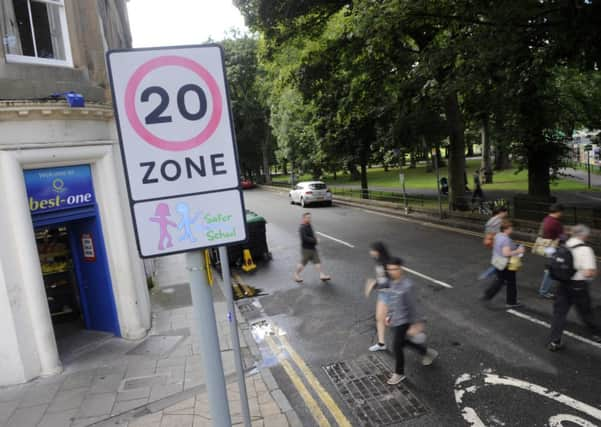20mph zones ‘will drive out tradesmen’


Tradesmen who rely on cars to travel between jobs would be unduly affected by road safety proposals to slash speed limits to 20mph, Gordon Henderson of the Federation of Small Businesses (FSB) said.
And he claimed the speed curbs would smear Edinburgh as an “anti-car city”.
Advertisement
Hide AdAdvertisement
Hide AdPlans to reduce speed limits in residential areas and a swathe of main roads are said to have provoked an “overwhelmingly positive” response from the public.
The move would see Leith Walk, Dalry Road and Portobello High Street become 20mph roads in one of the biggest roadway shake-ups in decades.
But Mr Henderson, who represents 2300 members of the Edinburgh FSB, said the speed cuts could “hinder the business” of tradesmen in particular.
“I think we’ll start seeing quite a few businesses moving away from the city centre as a result of these measures,” he said.
Advertisement
Hide AdAdvertisement
Hide Ad“Before long, we’re going reach the point where if you’re phoning a tradesman in need of work, they’re going to be closer to the city bypass.
“Quite simply, Edinburgh has become an anti-car city.”
The planned traffic overhaul could mean the lower speed limit becomes default throughout the city centre and outlaying areas.
The move has been welcomed by road safety campaigners and some community councils but has raised fears of dramatically increased journey times across the city.
Handyman Gavin Jenkins, of Edinburgh firm HomeForce, said the cost of slower and longer journeys may end up being passed on to customers.
Advertisement
Hide AdAdvertisement
Hide Ad“These new measures and restrictions might make journeys more difficult for tradesmen,” he said. “Unfortunately, that extra time spent stuck in traffic and searching for a parking spot might end up getting charged to the customer.”
Echoing this view, Tony Kenmuir, head of Central Taxis, said the council’s own research indicated that speed cuts had minimal impact on traffic congestion.
“I thought it was going to increase congestion, waste more fuel and increase journey times,” said Mr Kenmuir, whose input on the plans were invited by transport officials.
“But when presented with the council’s own findings, it turned out that speed reductions actually make almost no impact at all.
Advertisement
Hide AdAdvertisement
Hide Ad“Based on trial measures in several different zones, they concluded the introduction of traffic calming measures and reduced speed limits led to the average speed of traffic going from 22mph to 21mph.
“Now, we’re all in favour of increased safety for pedestrians and cyclists. But if average speeds are only going down by a mile per hour, I’m not sure it will accomplish much.”
Fears have also been raised that without proper enforcement drivers will flout the new 20mph restrictions. Alex Johnstone, transport spokesman for the Scottish Conservatives, said: “Blanket speed limits are a bad idea, because it means drivers don’t know in which areas it is most important to drive slowly. Speed limits must be variable, they have to reflect the conditions and surroundings of the road.”
But Robin Morris, chairman of Merchiston Community Council, said the community watchdogs backed the 20mph roll-out “100 per cent”, insisting that while it may be inconvenient to drivers it would be a “huge safety boost”.
A council spokeswoman said: “Based on the pilot study conducted, the council believes that this will actually make a significant impact in terms of road safety.”